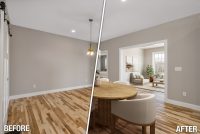How Does Depreciation Work in Real Estate?

How does depreciation work in real estate? Well, if you own rental properties or conduct business from your own home, you may be able to use depreciation to reduce your taxes. This is different from recording business expenses to offset your income, but we will use that as an analogy. You can think of a depreciation amount as an expense on your annual income statement. This is a simplified explanation for a complex process. So, let’s break down what depreciation is, which properties are eligible, and how you can use it to reduce your taxable income.
What is Depreciation?
Depreciation is a method of accounting used to spread the cost of something over its lifetime of use. This amount is not how much actual cash was paid upfront or over time. In real estate, deductions can be made to a property to account for wear and tear, which helps you save on taxes. The Internal Revenue Service (IRS) states that real estate depreciation allows you to “recover the cost of business or income-producing property.” There are different IRS-approved methods, but we’ll speak more generally about depreciation for the purpose of simplifying things.
Is the Property Eligible for Depreciation?
So, can you use depreciation to lower the taxes on any home? Well, not quite. The IRS requires you to own the property and use it for your business or to produce income. It must also have a “determinable useful life” expectancy of more than one year (IRS). This means you can depreciate certain areas of the property related to operating your business, such as a home office or workshop. You can also depreciate the entire cost basis (minus the land) to reduce your taxable income from rental properties.
How Does it Reduce Taxes?
The depreciation amount helps offset the income received, which reduces the taxes owed. Typically, the IRS considers 29.5 years to be the useful lifetime used to calculate depreciation for rental properties. There is also a set percentage that the property will depreciate by each year (remember, this doesn’t include the land). The amount of actual annual depreciation is then deducted from the income and expenses related to the property to find your actual taxable income.
Can Anything Else Depreciate?
It isn’t just the original property, or areas of the property, that can be depreciated. Additions and improvements are depreciable when treated as separate property. Certain repairs that improve the property, known as capital expenditures, can even be depreciable rather than treated as a business expense. For example, replacing the roof is an improvement, while fixing a section of the roof is a repair expense. You can also depreciate vehicles, machinery, equipment, and furniture (all with different restrictions).
This is a very simplified explanation to answer the question of how does depreciation work in real estate. There are many restrictions the IRS places on what and how you can depreciate property and income-producing items. Most importantly, you will eventually pay taxes on any capital gains from the “recaptured” depreciation when you sell the property. Think of depreciation more as short-term tax relief and be prepared for the bill to be due later. So before you start trying to depreciate your property and all its contents, it’s best to consult with a tax expert. They can look at your circumstances and advise the best options for you, including the appropriate depreciation methods. Don’t give the IRS a reason to come knocking!
Help reduce taxes with depreciation and help increase sales with high-quality real estate photos. Square Foot Productions is here for all your virtual staging and photo editing needs!








